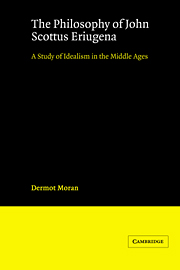Book contents
- Frontmatter
- Contents
- Preface
- Acknowledgments
- Chronology
- List of abbreviations
- 1 European intellectual culture in the ninth century
- 2 The predestination debate
- 3 Eriugena's life and early writings
- 4 The Greek awakening
- 5 The Periphyseon
- 6 Eriugena as philosopher
- 7 Eriugena's sources
- 8 Dialectic, philosophy, and the life of the mind
- 9 The meaning of human nature
- 10 Self-knowledge and self-definition: the nature of human knowing
- 11 The meaning of non-being
- 12 The meaning of nature
- 13 Eriugena's influence on later mediaeval philosophy
- 14 Conclusion
- Bibliography
- Index nominum
- Index rerum
3 - Eriugena's life and early writings
Published online by Cambridge University Press: 05 June 2012
- Frontmatter
- Contents
- Preface
- Acknowledgments
- Chronology
- List of abbreviations
- 1 European intellectual culture in the ninth century
- 2 The predestination debate
- 3 Eriugena's life and early writings
- 4 The Greek awakening
- 5 The Periphyseon
- 6 Eriugena as philosopher
- 7 Eriugena's sources
- 8 Dialectic, philosophy, and the life of the mind
- 9 The meaning of human nature
- 10 Self-knowledge and self-definition: the nature of human knowing
- 11 The meaning of non-being
- 12 The meaning of nature
- 13 Eriugena's influence on later mediaeval philosophy
- 14 Conclusion
- Bibliography
- Index nominum
- Index rerum
Summary
The predestination controversy marks the first written evidence we have of Eriugena's life and activities. We do not know when or where he was born, but modern scholarship, beginning with Cappuyns's monumental study of 1933, has agreed that he was born in Ireland near the beginning of the ninth century, probably around 800–810. Eriugena is not mentioned in the Annals of St. Bertin, which list events from 830 and were a continuation of the Royal Frankish Annals, the official record of events in the Carolingian realm. Pardulus's letter indicates that by the time of the De praedestinatione (c. 850–1), Eriugena was already attached to the Carolingian palace and was well known as a teacher of the arts. He undoubtedly enjoyed royal favour, because, unlike Gottschalk, he was not persecuted for his beliefs, as Florus lamented, and continued to work for Charles in the early 860s, as his translations of Dionysius testify.
Aside from what I have said about Irish and Carolingian culture in general, we have very little evidence of Eriugena's educational background and training. We have no evidence of his Irish schooling or of the reasons which brought him to the court of Charles. Although some have disputed it, we do know that John was Irish, from the remark of Prudentius that John was sent to France from Hibernia, that is, Ireland: “You alone, most sagacious of all men, Ireland sent across to Gaul in order that she might through your instruction possess knowledge such as none but you could master.”
- Type
- Chapter
- Information
- The Philosophy of John Scottus EriugenaA Study of Idealism in the Middle Ages, pp. 35 - 47Publisher: Cambridge University PressPrint publication year: 1989



